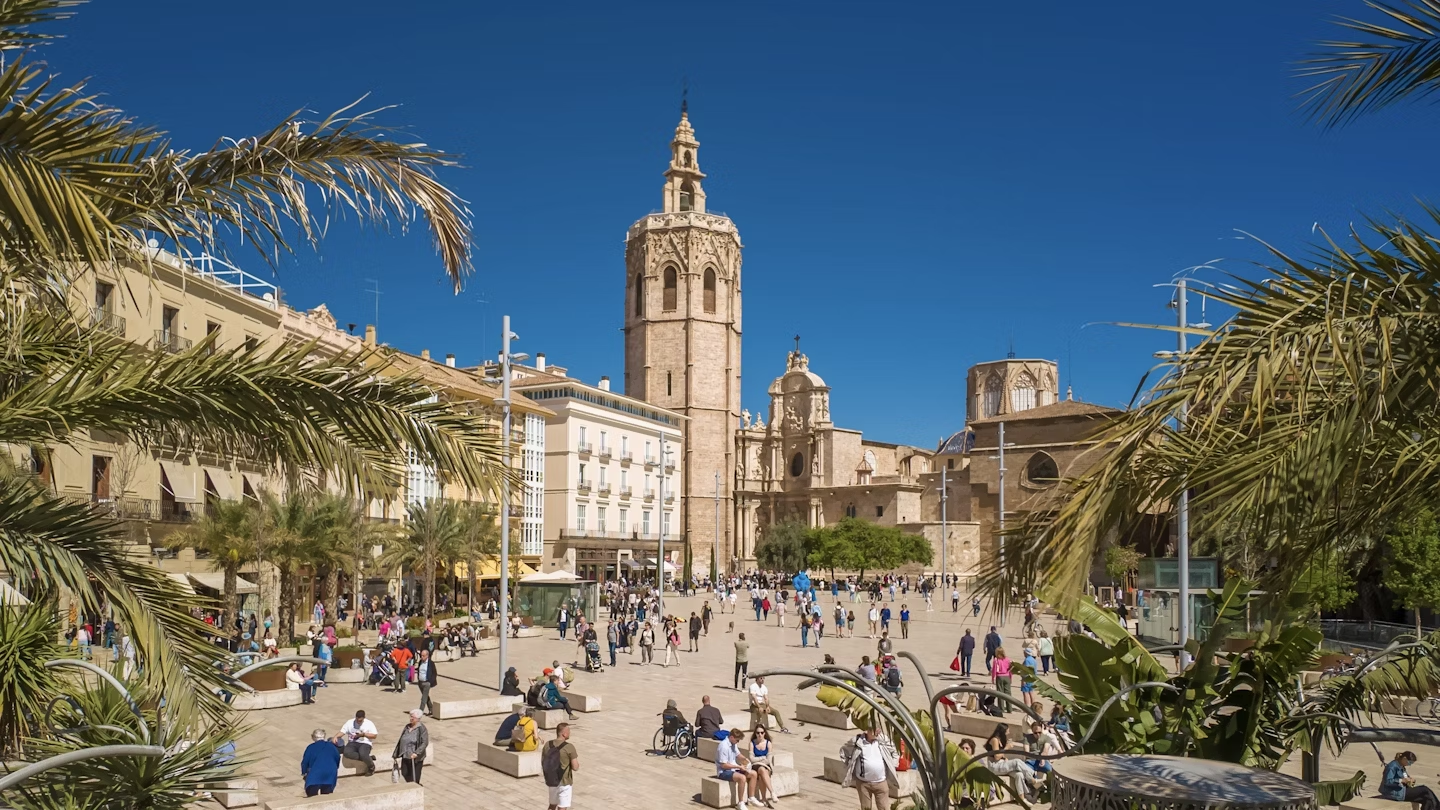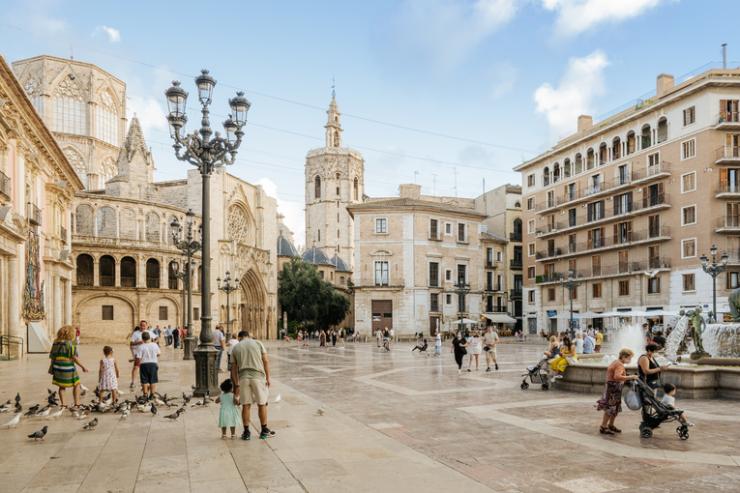CHAT
WITH US
WITH US
GET A
QUOTE
have questions? call us
+44 3330 907053
Home
/
Guides
/
Moving Guides
/
Moving to Valencia from the UK: A Step-by-Step Guide
Moving to Valencia f...

Moving Guides • Europe • 19 Nov 2024
Share this article
Are you dreaming of starting a new life in Valencia, the vibrant coastal city in southern Spain? With its stunning architecture, delicious cuisine, and relaxed Mediterranean lifestyle, it's no wonder that Valencia has become an increasingly popular destination for British expats. In this step-by-step guide, we'll walk you through the process of relocating to Valencia, from the initial planning stages to settling into your new life in this charming Spanish city.
Before you start planning your move, it's essential to determine your eligibility to move to, and live in Spain. As a UK citizen, your rights to live and work in Spain have changed since Brexit.
If you moved to Spain before December 31, 2020, and have been living there since then, you might already have a residence status that allows you to continue living in Spain. If you plan to move after this date, you'll need to apply for a visa.
The type of visa you'll need depends on your reason for moving to Spain, such as:
It's essential to start the visa application process well in advance of your planned move date, as it can take several months to process. For more information on visas and the application process, visit the Spanish Ministry of Foreign Affairs website.

Once you've confirmed your eligibility to live in Spain, the next step is to find a place to live in Valencia. Valencia offers a range of housing options, from modern apartments in the city centre to charming villas in the surrounding suburbs.
Renting a property is a popular choice for expats moving to Valencia. You can find rental properties through various channels, such as:
When renting a property in Valencia, be prepared to pay a deposit (usually equivalent to 1-2 months' rent) and provide references. Rental contracts in Spain are typically for a minimum of 12 months.
If you're planning to stay in Valencia long-term or are considering a golden visa, buying a property might be an attractive option. The process of buying a home in Spain involves several steps, including:
For more information on buying a property in Spain, consult with a local real estate agent or lawyer specialising in property transactions.
Once you've secured accommodation in Valencia, you'll need to register with the local authorities. This process, known as "empadronamiento," involves registering with the municipal register (padrón municipal) in your area of residence.
To register, you'll need to visit your local town hall (ayuntamiento) and provide:
After registering, you'll receive a certificate of registration (certificado de empadronamiento), which is necessary for various administrative tasks, such as applying for a Spanish driving licence or enrolling children in local schools.
Your Foreigner Identity Number (Número de Identidad de Extranjero or NIE) is a unique identification number assigned to foreigners living in Spain. You'll need an NIE for various purposes, such as opening a bank account, buying a property, or paying taxes.
To obtain your NIE, you'll need to book an appointment at the local police station or immigration office (Oficina de Extranjería) and provide:
After your application is processed, you'll receive your NIE certificate, which you should keep safe as you'll need it for various administrative tasks during your stay in Spain.

Having a Spanish bank account is essential for managing your finances and paying for local services. Some of the main banks in Spain include:
To open a bank account, you'll typically need to provide:
Some banks may allow you to start the application process online, but you'll usually need to visit a branch in person to complete the process and receive your debit card and online banking details. It's worth comparing fees and services between different banks to find the best option for your needs.
Spain has a public healthcare system that provides high-quality care to all residents. As a legal resident in Spain, you'll be entitled to access the public healthcare system once you've registered with the Spanish social security system and obtained your healthcare card (tarjeta sanitaria).
If you're employed in Spain, your employer will arrange for your registration with the social security system. If you're self-employed or not working, you'll need to register yourself and pay monthly contributions to access the public healthcare system.
Alternatively, you can choose to take out private health insurance, which may offer shorter waiting times and access to a wider range of facilities. Some of the main private health insurance providers in Spain include:
It's essential to arrange healthcare coverage as soon as possible after your arrival in Valencia to ensure that you have access to medical care when you need it.

As a resident in Spain, you'll be required to pay taxes on your worldwide income. The Spanish tax system is progressive, with tax rates that depend on your income level.
If you're employed in Spain, your employer will deduct taxes from your salary each month. If you're self-employed or have other sources of income, you'll need to file a tax return (declaración de la renta) each year, typically between April and June.
It's important to familiarise yourself with the Spanish tax system and your obligations as a taxpayer. For more information, consult with a local tax advisor or visit the Spanish Tax Agency website.
If you're moving to Valencia with school-age children, you'll need to enrol them in a local school. Spain has a public school system that provides free education to all children between the ages of 6 and 16.
To enrol your children in a public school, you'll need to visit the local education office (Oficina de Educación) and provide:
Alternatively, you can choose to enrol your children in a private or international school, which may offer bilingual education or follow a British curriculum. However, these schools typically charge tuition fees.
While many people in Valencia speak English, particularly in tourist areas, learning Spanish will greatly improve your experience of living in the city and help you integrate into the local community.
There are several ways to learn Spanish, such as:
Learning Spanish will not only make your daily life easier but also open up new opportunities for work, socialising, and fully immersing yourself in the vibrant Spanish culture.
Living in Valencia offers the opportunity to experience a unique and enriching culture. To make the most of your time in the city, try to embrace the Valencian lifestyle:
Moving to a new country is always a big undertaking, but with careful planning and preparation, you can make your transition to life in Valencia as smooth as possible.
If you need assistance with shipping your belongings to Valencia, consider reaching out to Deliver1, the leading company for European removals. With our extensive experience in relocating UK citizens to Spain and other European destinations, we can help ensure that your possessions arrive safely and on time.
From packing and loading to customs clearance and delivery, our team of experts will handle every aspect of your move, giving you peace of mind and allowing you to focus on settling into your new life in Valencia.
To learn more about our services and how we can support your move to Valencia, please get in touch with us today.
We love hearing from you-so please get in touch with any questions or queries.
We love hearing from you-so please get in touch with any questions or queries.
Working hours
Mon - Sat: 08:00 - 17:00
Sun: Closed
Call
+44 3330 907053Location
Unit 3, Newyears Green Lane
Newyears Green
Uxbridge
UB9 6LX
United Kingdom
